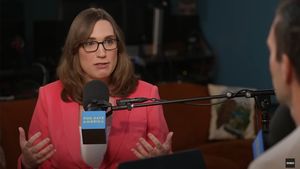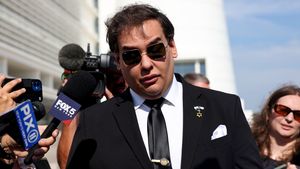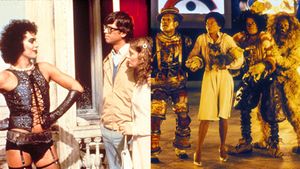The title of Karen Paull and Wendy Robbins's reality competition, The Marijuana Show, conjures up Snoop Dogg and Cheech & Chong, not well-groomed lesbians handing out tens of millions in start-up capital.
The married couple are well aware their show's name will get people talking (the show's logo features George Washington smoking a joint). Before the women came up with the idea for their Shark Tank-like cannabis show — where budding cannabis entrepreneurs pitch Paull and Robbins before presenting business plans to big-money investors — they were high-powered Los Angeles executives who knew the fine art of marketing. But when Colorado legalized recreational use of marijuana in 2012, they saw the possibilities.
"If you want to get into a business more lucrative than any other right now, it's cannabis," Robbins tells The Advocate.
For a show currently only available online — but possibly coming to a major network or Netflix — the show's prizes are astounding. Paull and Robbins handed out over $13 million in start-up money to entrepreneurs during the recently filmed second season (the women get a piece of ownership in the finalists' companies), with contestants pitching everything from cannabis-infused dog biscuits to weed spas to hemp-powered cars.
"We're trying to demystify [marijuana], take all the stereotypes of the typical stoner out of the equation, and reflect the new economy," Paull says. "The green economy."
That's not to say the women aren't touting the reported health benefits of marijuana. Robbins started using cannabidiol, a nonpsychoactive oil, for her back problems. Paul admits to occasionally inhaling, but says she prefers vaping because "it's easier on the lungs." Both women espouse Incredibles, edible cannabis-infused chocolates.
"[Incredibles] help with sleep," Robbins says. "I don't like to take chemicals [to fall asleep], so I prefer plants. And I get my chocolate fix."
Robbins's first experiences with marijuana date back to her early teenage years, when she started dealing after she left home. She had an incredibly difficult time coming out to her family, who have since grown more comfortable with her orientation and her current line of work. Regarding marijuana, Robbins's conservative parents "now see the opportunities for it, and that's been a wake-up call for them and many in their generation."
Paull says coming out about working in the cannabis industry is "like coming out of the closet again." Paull's father is a Fox News watcher and was initially very skeptical of The Marijuana Show. "Now he's watched all our episodes and calls up and says, 'Me and my friends are thinking of making pot brownies.' He's 80!"
The women see parallels between American society's gradual acceptance of marijuana and the slow embrace of marriage equality.
"Look how long it took for the Supreme Court to step in on marriage," Paull says. "It's sort of the same thing [with marijuana], where it starts to get more and more legal."
Paull and Robbins see enormous growth potential in the industry, with states like California moving toward legalization of recreational use. From the first to second seasons, Paull and Robbins noticed an increased level of knowledge and sophistication among the contestants when it came to the myriad rules to follow and permits to obtain.
"This industry is really hard because it changes week to week," Robbins says. "And if you're not legally in compliance, you'll end up in jail. There's a lot at stake."
Splitting their time between Taos, N.M., and Denver (The Marijuana Show films in the Colorado capital), the women have witnessed the enormous changes that legalization has brought to not only their contestants' financial lives but Colorado as a whole.
"The schools have all the money they need," Robbins says. "[Marijuana taxes] are paying for new roads and infrastructure. They're even talking about giving taxpayers back money."
It's not just money that the women want to highlight with their show, though. In the third season, they're hoping someone will pitch a cannabis creation that will specifically help people living with diseases like multiple sclerosis or HIV.
"We definitely want to reflect healing stories," Robbins says.
The second season of The Marijuana Show premieres in early 2016. Click here for more information and watch the show's trailer below.































































































































